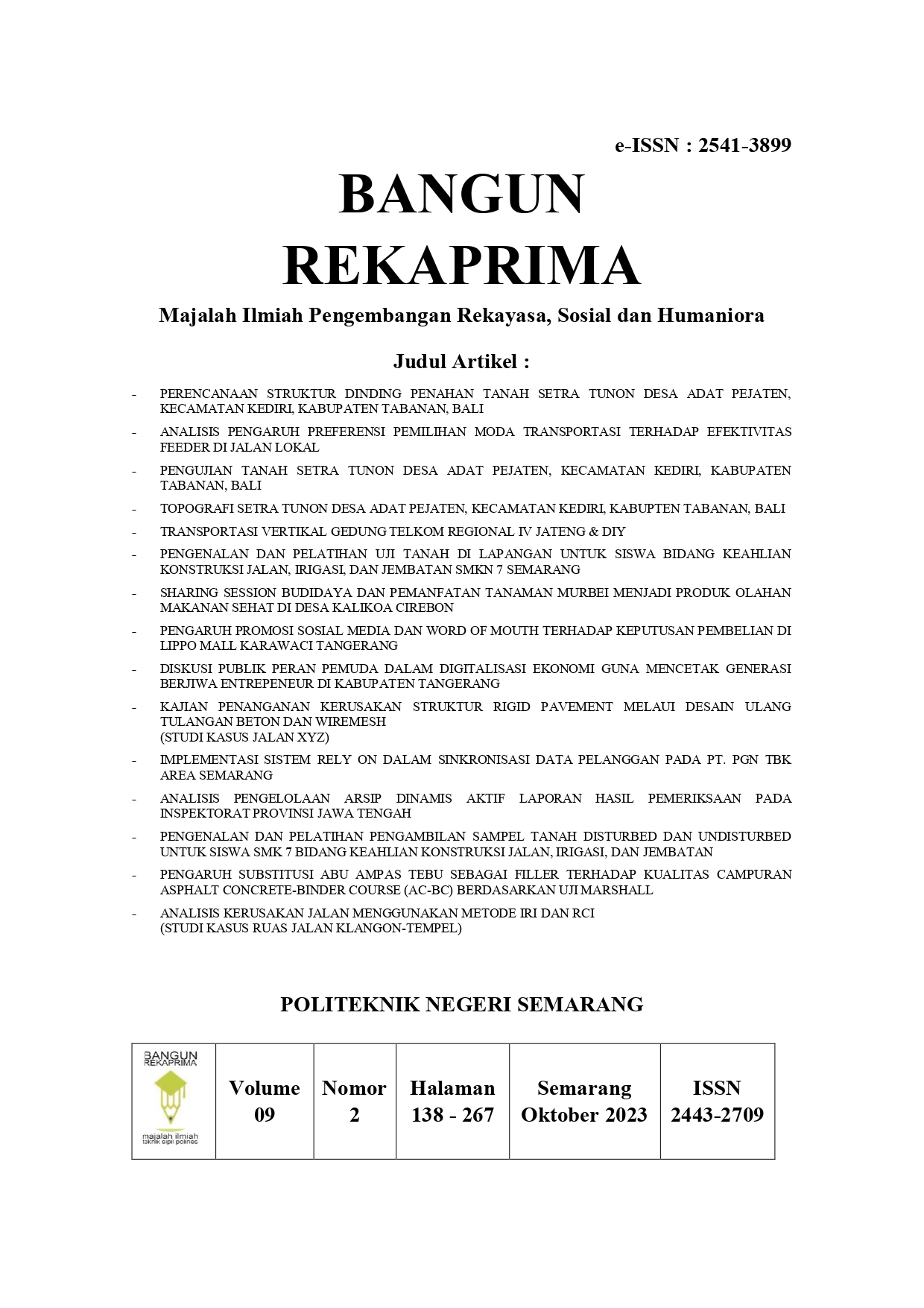IMPLEMENTASI SISTEM RELY ON DALAM SINKRONISASI DATA PELANGGAN PADA PT. PGN TBK AREA SEMARANG
DOI:
https://doi.org/10.32497/bangunrekaprima.v9i2.5210Keywords:
Implementation, Rely On System, SynchronizingAbstract
This research focuses on the implementation of the Rely On system operated by PT PGN Tbk, which is a state owned company providing services to the general public in gas sales activities. This study aims to describe the implementation of the Rely On system in synchronizing customer data and solutions to problems that occurred in 2019-2020 related to customer data errors. This final project is written descriptively, with the research methods used are interviews, observations at PT PGN Tbk Area Semarang and literature study. This study uses the TAM approach to determine perceptions of ease and usability in implementing the Rely On PGN system. The difficulty of finding customer data to make payments is a problem faced by the company. Solutions owned by the company can provide innovative or sophisticated features in the Rely On system, implement periodic data control, and provide suggestions to the central office to link all data from sub-districts, RT, RW so that data searches are easier to do. The result of this research is that thecompany's image as a service provider is getting better.
References
Adi, P., & Permana, G. 2018. Penerapan Metode TAM (Technology Acceptance Model). 10(1), 1”“7.
Aditya, F., Andikaputra, T., Yulandary, W., Zulvia, P., & Bergi, A. 2022. Meninjau Efektivitas Sistem Rely-on Dalam Menunjang Pengelolaan Pelanggan Pada PT . Perusahaan Gas Negara ( PGN ) Area Batam. 3(2), 143”“162.
Amalia, Rizky, dkk. 2022. Evaluasi dan Audit Aplikasi Mobile JKN pada BPJS Kesehatan Menggunakan Model TAM dan COBIT 5.0. Jurnal Penelitian Ilmu dan Teknologi Komputer. Palembang: Politeknik Negeri Sriwijaya.
Çelik, K., & Ayaz, A. 2022. Validation of the Delone and McLean information systems success model: a study on student information system. Education and Information Technologies, 27(4), 4709”“4727. https://doi.org/10.1007/s10639-021-10798-4
Csirmaz, E. P., & Csirmaz, L. 2022. Data Synchronization: A Complete Theoretical Solution for Filesystems. Future Internet, 14(11), 1”“21. https://doi.org/10.3390/fi14110344
Priyono, & Teddy Chandra. 2008. Metode Penelitian Kuantitatif (Edisi Revisi). Sidoarjo: Zifatama Publishing.
Gitlin, J. 2023. What is data synchronization? And why is it important?.Workato. https://www.workato.com/the-connector/data-synchronization/
Hanyfah, S., Fernandes, G. R., & Budiarso, I. 2022. Penerapan Metode Kualitatif Deskriptif Untuk Aplikasi Pengolahan Data Pelanggan Pada Car Wash. Semnas Ristek (Seminar Nasional Riset Dan Inovasi Teknologi), 6(1), 339”“344. https://doi.org/10.30998/semnasristek.v6i1.5697
Insani, R. B., Darmawan, A., & ... 2022. Implementasi Kebijakan Diskon Pasang Baru Di Pdam Surya Sembada Kota Surabaya (Indikator Sumber Daya). Skripsi. https://conference.untag-sby.ac.id/index.php/snhs/article/view/1097
Nurwantoro, T. 2015. Kerangka Kerja Sinkronisasi Basis Data Web Berbasis Web Pada Studi Kasus Sistem Informasi Akademik.1”“130.
Paramita, Ratna Wijayanti Daniar, Noviansyah Rizal, Riza Bahtiar Sulistyan. 2015. Metode Penelitian Kuantitatif (Edisi 1). Lumajang: Widya Gama Press
Rifatullah, Muhammad. 2018. Sinkronisasi Basis Data Relasional Menggunakan Paradigma Publish-Subscribe. Fakultas Teknologi Informasi dan Komunikasi. Surabaya: Institut Teknologi Sepuluh Nopember
Rokhmah, S., & Setyaningsih, P. W. 2020. Analisis Aechnology Acceptance Model (TAM) pada aplikasi e-learning dikalangan dosen dan mahasiswa ITB AAS Indonesia. November, 210”“218.
Rusandi, & Rusli, M. 2021. Merancang Penelitian Kualitatif Dasar/Deskriptif dan Studi Kasus. Al-Ubudiyah. Jurnal Pendidikan Dan Studi Islam, 2(1), 48”“60.
Septarini, A. D., Tuhagana, A., & Anggela, F. P. 2022. Analisis kualitas pelayanan pada PT Perusahaan Gas Negara tbk, area Karawang. Fair Value: Jurnal Ilmiah Akuntansi Dan Keuangan, 5(5), 2127”“2135. https://doi.org/10.32670/fairvalue.v5i5.2722
Sugiyono. 2005. Memahami Penelitian Kualitatif. Bandung: CV. Alfabeta.
Sugiyono. 2018. Metode Penelitian Kuatitatif. Bandung: Alfabeta.
Sugiyono. 2019. Metode Penelitian Kuantitatif Kualitatif dan R&D. Bandung: CV Alfabeta.
Tatipatta, R. V. F. 2019. Penerimaan Teknologi Informasi Employee System Di Dengan Menggunakan Technology Acceptance Model. Penerimaan Teknologi Informasi 41 JPSB, 7(1).
Usman, N. 2002. Konteks Implementasi Berbasis Kurikulum. Jakarta: PT Raja Gravindo Persada.
Yanti, N., Hendarsono, Y., & Nengyanti. 2022. Transformasi Spasial di Kota Ternate. Journal of Management & Business, 5(2), 338”“350.
Zucker, S. G., & Wang, S. 2009. The impact of data synchronization adoption on organizations: A case study. Journal of Electronic Commerce in Organizations, 7(3), 44”“64. https://doi.org/10.4018/jeco.2009070103
Downloads
Published
Issue
Section
License
The copyright of the received article shall be assigned to the journal as the publisher of the journal. The intended copyright includes the right to publish the article in various forms (including reprints). The journal maintains the publishing rights to the published articles.

This work is licensed under a Creative Commons Attribution 4.0 International License.






